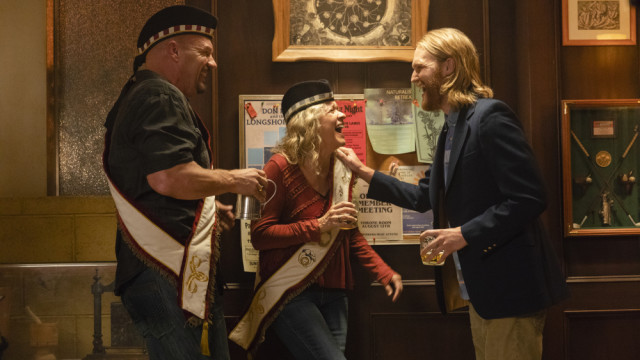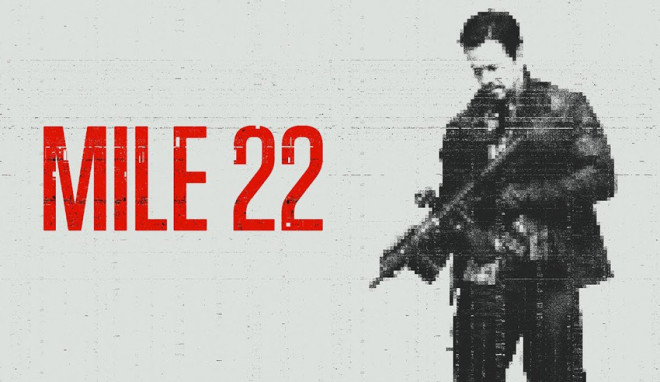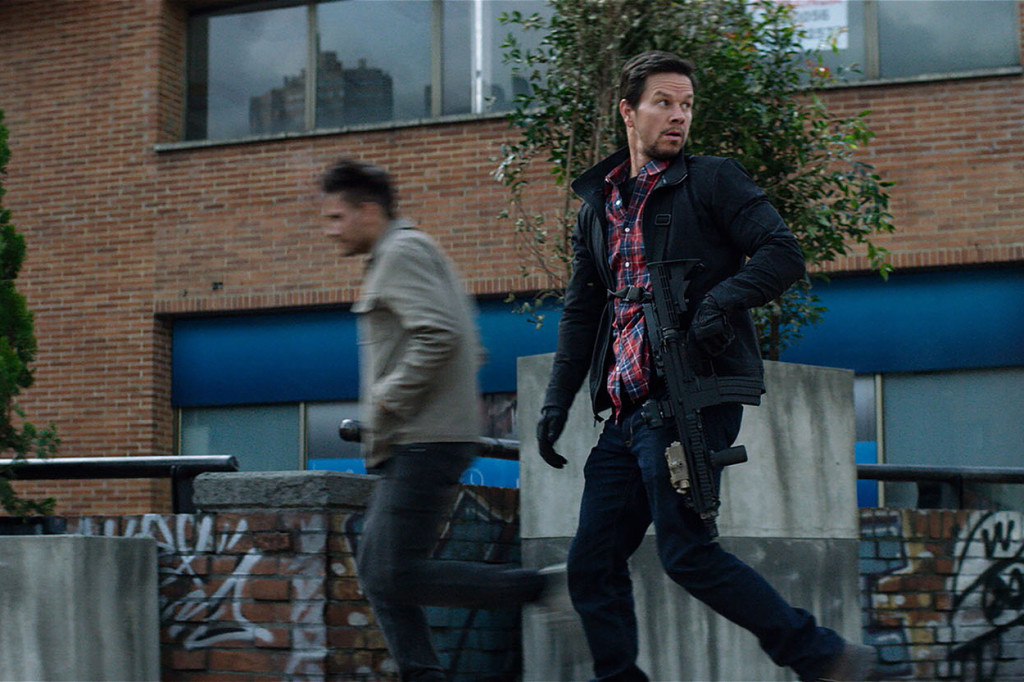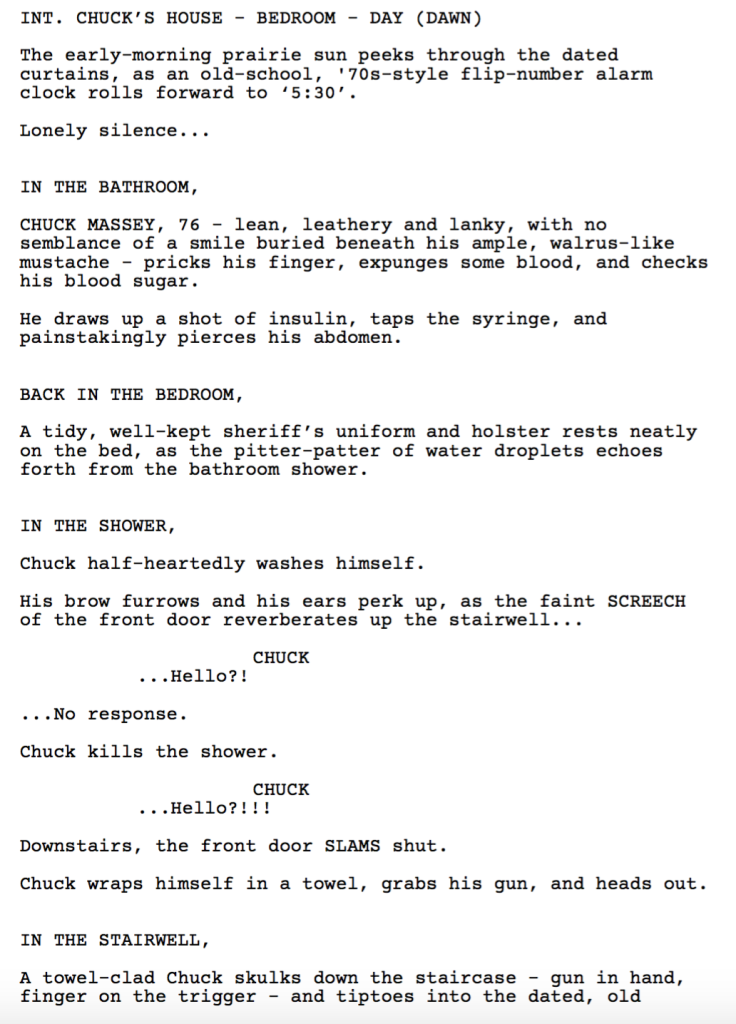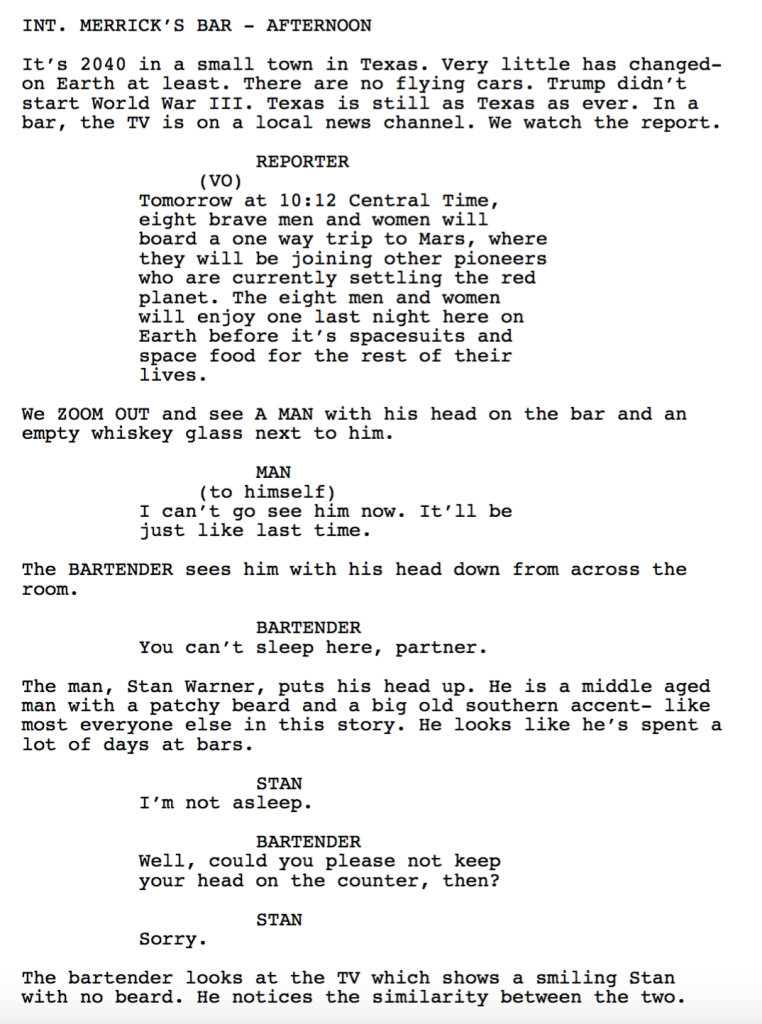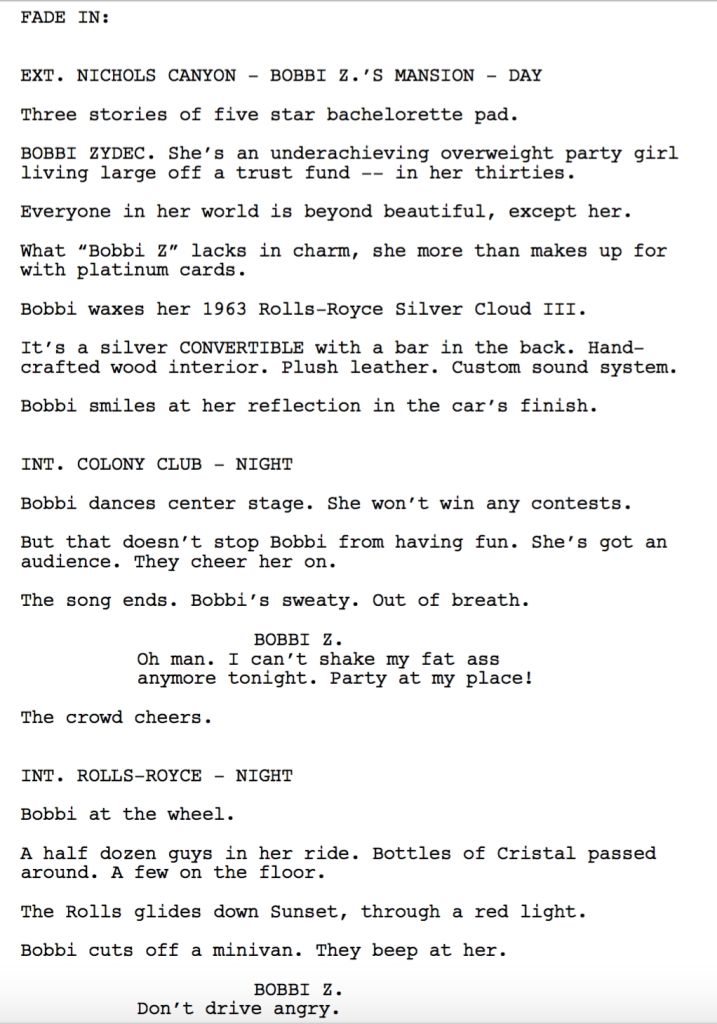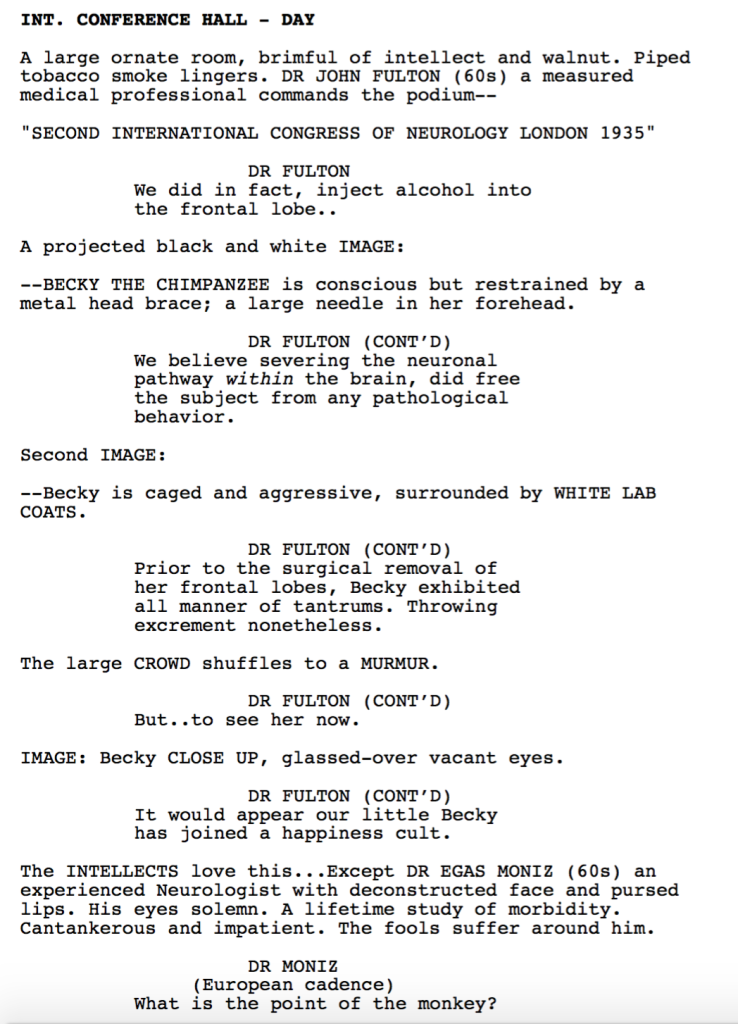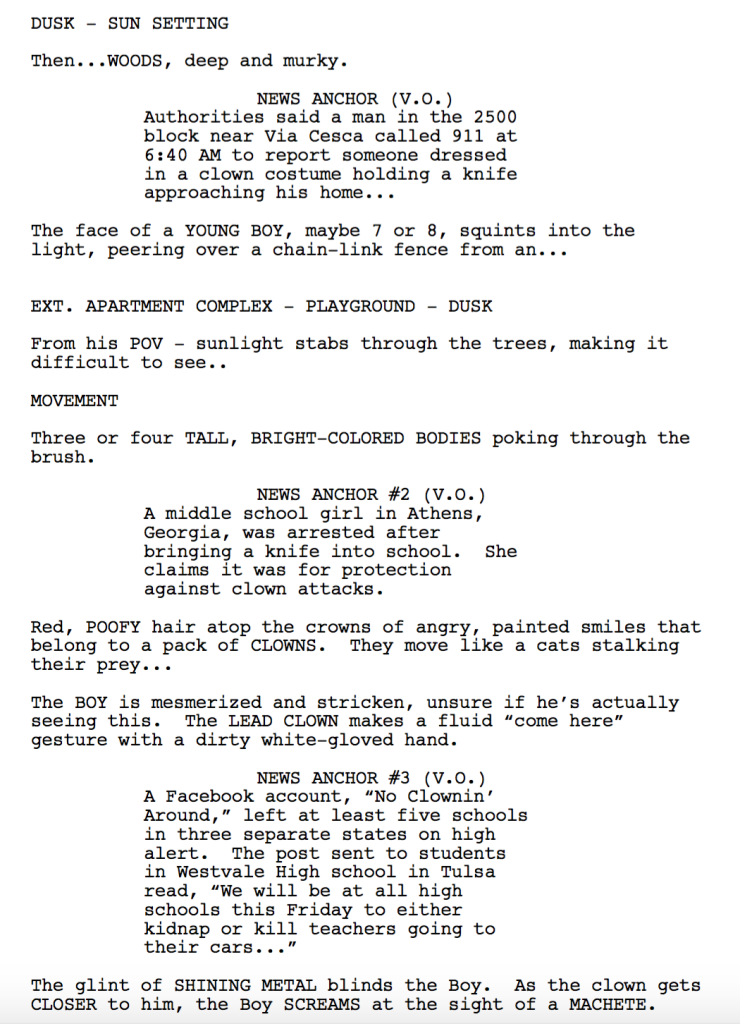Genre: TV Pilot – 1 Hour Drama
Premise: (from IMDB) A young guy from Long Beach joins a local fraternal group, Lodge 49.
About: Today’s pilot comes from brand spanking newcomer Jim Gavin, a 38 year old who grew up in Long Beach and used to work in plumbing, which plays a prominent role in one of the characters lives of Lodge 49. The series is premiering on AMC’s new streaming service. It’s executive produced by Paul Giamatti and stars Kurt Russell’s son, Wyatt Russell.
Writer: Jim Gavin
Details: 60 pages
One of the most common criticisms I give screenwriters goes something like this:
“Where the F is the concept??!”
You can’t write about nothing, or next to nothing, and expect people to get excited about it.
But writers keep doing it. Why? Because there are always a couple of successful “zero concept” projects they can point to. “But Boring Show 1 is still on the air, Carson.” “Oh but Carson, Nothing Happens Movie 2 made a lot of money.”
To this I say… you’re right. There are examples of shows and movies out there that don’t have a concept to hang their hat on.
HOWEVER!
How tiny your concept is, is indirectly proportional to how lucky you have to get. So go ahead and write something that doesn’t have a selling point. It’s just characters or it’s just people in a small town trying to live life. You can write that. But the further you are away from a genuine hook, the more your success will depend on luck.
Which brings us to today.
Lodge 49 isn’t about anything.
Well, it’s about something. Sort of. A former surfer living in Long Beach joins an adult club of people who occasionally get together for drinks.
Exactly.
As soon as it became clear to me that that’s all this script was about, I had to find out how it got made. Because this is the secret sauce, guys. You must take stock of how people break in to see if it’s something that could work for you. All it takes is one success story that you think you can replicate to motivate you.
Unfortunately, I couldn’t figure out how this writer got anyone to pay attention to his pilot. This is his first known project. He’s got no IMDB credits. What happened here? I have a theory. Looking back, it turns out Jim Gavin wrote a short story book called Middle Men in 2013. It was not a best seller and virtually nobody knows about it (it has 62 reviews on Amazon).
But here’s what agents love to do. Agents love to send out books. It’s one of their favorite things. They send them to out out to writers, to directors, to actors. Everyone’s mass sending these things out, hoping to spark the interest of someone with an actual name, someone who can get a project going.
I suspect that Middle Men landed in Paul Giamatti’s hand as a potential movie project. He didn’t think there was a movie there. However, he liked the writing. So he met with Jim and asked him if he had any other ideas. A TV show perhaps. Jim pitched him Lodge 49, and Giamatti decided to shepherd it.
For all of you wondering, this is one possibility for how a show without a concept gets made.
Now a lot of this is admittedly speculation. But this is how a ton of deals go down. Someone likes something you wrote. They want to meet with you. They tell you they didn’t flip for the script/book, but they like your writing. If you’re prepared for these meetings with several pitches, you can cash out. Which I suspect was the case here.
That’s a lot of chit-chat for a show I haven’t even broken down yet. So maybe now’s the time to tell you that I actually liked this pilot!
Sean “Dud” Dudley lives in the bastard of Los Angles beach communities, Long Beach. Dud isn’t living day to day. He’s living hour to hour. The Lebowski-adjacent 30 year old recently got kicked out of his apartment cause he couldn’t pay the rent. And he’s sold nearly everything he owns to the local pawn shop in order to eat. If Dud doesn’t turn his life around soon, he’s in some major shit.
Meanwhile, 60 year old degenerate gambler Ernie Fontaine is in almost as bad of a shape as Dud is. I guess he’s in worse shape cause he’s got 30 years on him. The lifelong plumber bets away every dime he has and is about to get a visit from some bad men to remind him of just how much money he owes.
Dud, a former surfer, is so desperate for cash, he’s searching for lost jewelry on the beach with a metal detector. And that’s when he finds a gold ring with a strange symbol on it. He shows it to the pawn shop owner, who tells Dud it belongs to a club called “The Lynx.” They’ve been around since the 50s and are sort of a… I guess adult fraternity is the best way to put it.
Curious, Dud heads to the Lynx, where he meets Ernie. Yes, it turns out Ernie is a member! Dud feels a deep connection with the Lynx, that it could be the key to getting his life back on track. So he begs Ernie to let him become a member. “Sure,” Ernie says. “You’re a member.” Apparently, it’s very easy to become a Lynx.
And that’s pretty much the pilot.
I know, right?
That’s all.
So why did I like it?
Okay, so here’s the thing. If you’re going to write a show about a loser, we have to love that loser. Especially if there isn’t a whole lot going on plot-wise. Gavin nails the formula for making us love Dud.
1) The system has to have screwed the hero over some way. Dud was kicked out of his family home, the place he loves more than anything.
2) He has to be funny. Dud is hilarious in that understated stoner way. For example, when he walks into the gas station after scrounging through his car for every available coin to pay for gas, he dumps $4.23 on the attendant’s counter. Then, just as he turns to leave, he sees a penny on the floor. “Nice!” he says, picking it up and placing it on the pile. “I’d like to add this to my purchase.”
3) He has to keep fighting. If you turn this character into a woe-is-me? We’ll hate him. We only root for heroes that fight, even when the chips are down. Dud is determined to get his life back on track.
When you nail the lead character in a TV show, it gives you a lot of leniency. Because even though the plot was mostly boring, I enjoyed every scene Dud was in. I was curious what he was going to say or do next.
With that said, Gavin could’ve done himself a huge favor and added a Scriptshadow Staple. What do you do if you’re writing a character piece that doesn’t have a lot of plot?
Drop in a dead body.
Give us a murder.
A local murder could’ve juiced this pilot up so much.
As it stands, I suspect Gavin will run into trouble stretching this out to 10 episodes. When you’re struggling to get enough story into a pilot, that’s telling me you’re going to run into major problems come the 3rd and 4th episodes. We need things that the characters are moving towards. Mysteries that need to be solved.
The Lynx wasn’t that mysterious. It was presented as a bunch of loser-ish people in their 50s who drink a lot. How are you going to build storylines out of that?
I don’t know. But what I do know is that I love this character, and this setup was quirky enough to keep me invested. I don’t know how in the world to get to AMC’s streaming service, so I guess I’ll have to wait for it to hit Itunes.
[ ] What the hell did I just read?
[ ] wasn’t for me
[x] worth the read
[ ] impressive
[ ] genius
What I learned: It’s so important these days to have multiple projects in multiple mediums. You need more than one egg in the basket. But more importantly, you need to be able to point to things THAT YOU’VE DONE. Gavin couldn’t will a TV show into existence. But he can get a book online. You’d be surprised at the way people look at you when you casually drop tidbits like, “I just finished a novel.” When you say stuff like that, people believe you’re serious about writing. And you never know who might spark to that book or other project. Who you could meet.
Genre: Action
Premise: The CIA must transfer an Indonesian cop to a remote airfield 22 miles away while avoiding the most dangerous man in the country, whose livelihood depends on killing everyone in their transport.
About: One of the biggest bromances in Hollywood – Mark Wahlberg and Peter Berg – continues with Mile 22. This testosterone injection app was written by Graham Roland, who’s written on Lost, Prison Break, Fringe, and most recently created Amazon’s “Jack Ryan” series. Later on, newcomer Lea Carpenter would take on writing duties. But this is the original draft, before she got involved. The movie debuts a week from Friday and, in addition to Wahlberg, stars The Walking Dead’s Lauren Cohan, and Iko Uwais, who came to prominence in The Raid films.
Writer: Graham Roland
Details: 11/27/14 draft
I liked this script a lot.
And after finishing it, I wondered why I liked it so much more than the universally lauded Mission Impossible 6. They’re both testosterone-fueled realism-based action films with dudes and sometimes chicks shooting at each other. What’s the difference?
The difference is that Mission Impossible starts its brainstorming session by asking, “What cool action scenes can we create?” Once it has that figured out, they build a story around it.
Mile 22, meanwhile, was built around a concept. Trying to transport someone 22 miles to freedom, with everyone in the city trying to stop them. As a result, everything feels more organic. When an action scene in Mile 22 arrives, it arrives because it needs to arrive. It doesn’t arrive because the director really wanted that scene in the movie and had to move mountains to wedge it into the screenplay somehow.
And that’s all I’m asking for whenever I sit down to watch something – I want a good story. This is why, even though I’m not a big action guy, if you give me a good story with good characters, I’ll watch anything, even if it’s not in my wheelhouse.
This early version of Mile 22 focuses on Yuda, an Indonesian Police Lieutenant who unknowingly kills an important man during a drug raid after coming in on him ripping out the organs of a young woman. Yuda’s commander is furious, as it turns out he’s killed the nephew of the biggest crime boss in the city, Iblis Gurret.
The Indonesian police and Gurret’s gang come together to try and resolve this issue. And when Yuda realizes that they’re probably going to kill him, he flees. It doesn’t take long for Gurret’s guys to find him and kill his family. Yuda escapes once again, this time going to the only place he knows he’ll be safe, the U.S.’s CIA headquarters in the city.
Yuda offers the CIA a deal. He’ll give them information on some dead CIA agents if they’ll provide him with asylum. After they strike a deal, the CIA learns that Gurret, who’s some crazed black magic weirdo who cuts out the hearts of his victims, killed three of their agents. Now they have to hold up their end of the deal and fly Yuda back to the US. Unfortunately, the Indonesian Police control all the airports. So their only shot is driving Yuda to an abandoned airfield, 22 miles away, and having U.S. air support pick them up.
Leading the operation are Silva, a tough-as-nails can’t-shake-him agent, and Jett, who never wanted to be stationed in this country in the first place. As they gear up, they realize that their own network may have been compromised, and that because they now have information that could doom Gurret’s gang AND the police, that everyone in the city will be after them. Needless to say, it’s going to be one hell of a ride.
Man, this reads different from the trailer.
It looks like the first thing they changed was the black magic stuff. I found that a curious decision only because it was the most original stuff in the screenplay. But I can see guys like Wahlberg and Berg going in another direction. They’re fairly open about their love for realistic scenarios. Not to mention, we live in the most overly sensitive time in history. So if you make your Indonesian villain a black magic heart-eater, you might as well come up with the Twitter racism campaigns yourself.
They also changed the information that Yuda was carrying. The CIA killings were tied to the black magic, so after dropping the black magic plot, they had to change the “evidence” on the thumb drive as well. So now it’s information on “9 pounds of missing radioactive isotope.” That’s one of the drawbacks of eliminating unique plot points. Is the ancillary plot points become generic.
One of the funnier changes they made was reversing the importance of the two CIA agents. In this version, Jett, the female character, is the star. She’s the one with the complicated backstory and all the lines. Clearly, as soon as Mark Wahlberg came onto the project, he changed all that. You can see that he’s front and center with the decision-making in the trailer.
It also looks like they took out the slaughtering of Yuda’s family. This I can understand. If you just had your wife, kids, brother, nieces and nephews slaughtered in front of you, I don’t know if you’re gung-ho about going to the CIA and trying to escape the country. At that point, you’re essentially dead, right? Where are you getting your motivation? And it’s just a sad reality for the audience to endure. These movies are supposed to be fun. I’m not sure an audience is having fun after a family’s been turned into pulled pork.
But none of this matters because the heart of this concept is so strong. The idea of getting this dangerous person through the city with everyone who owns a gun trying to stop you is going to work regardless of how you move the pieces around. This is why everyone harps on the importance of concept. When you get the concept right, it does all the hard work for you.
Reading this, I can imagine how fun it would’ve been to write. When you have these setups, your goal as the writer is simple: THROW AS MUCH SHIT AT THE CHARACTERS AS POSSIBLE. So in their very first encounter with the gang, they get blown off the street. We’re a mile in and they’ve already lost their vehicle. Then they find out one of their own is broadcasting their location to the bad guys every few minutes. Then they learn that Gurrett just put a price on their head. Now EVERYONE in the city is after them. You keep making it worse and worse on your heroes and the joy comes in watching them try to emerge unscathed.
Oh, and I’d be remiss if I didn’t mention that NONE OF THIS WORKS unless you use your first act to make us fall in love with your characters. Roland did an amazing job setting up the characters of Yuda and Jett. I’d say each of them gets 5-8 pages of solid character development. Then, and only then, do we care when these characters are getting shot at later. When you don’t do this properly, your screenplay is empty action. And there’s nothing more boring than reading empty action.
[ ] What the hell did I just read?
[ ] wasn’t for me
[xx] worth the read
[ ] impressive
[ ] genius
What I learned: Your first act is where you’ll do the bulk of your character work. This is where you set up the character’s flaw, their history, their relationships, and whatever else you want to throw in there that invokes an emotional connection to the character. Do this in the second act, after the reader has already determined that the character is boring, and it’s probably too late. Case in point: Silva. He’s introduced in a boring way. He doesn’t talk much. When he does talk, it’s nothing special. He doesn’t have any connections to anyone else we care about. Diagnosis: BORING. Later on, Silva reveals that his wife died of cancer. But by that point, it was too late. We’d already determined this character was weak-sauce.
I’m still trying to figure out how a McDonald’s Monopoly article became one of the hottest projects in town, seemingly overnight. As a screenwriter, it’s your job to take note of what A-list actors and directors are drawn towards so that you can use that knowledge in deciding what you yourself should write to attract similar talent. I don’t know why this one is garnering so much interest though. It seems dumb. What’s not dumb? Reading and voting on this weekend’s Amateur Offerings scripts!
For those playing for the first time, Amateur Offerings asks you to read as much as you can from each script and vote for your favorite in the comments section. The script with the most votes will receive a review next Friday!
And if you believe you have a screenplay that’s better than anything Hollywood is making at the moment, submit it for a future Amateur Offerings! Send me a PDF of your script, along with the title, genre, logline, and why you think people should read it (your chance to pitch yourself or your story). All submissions should be sent to Carsonreeves3@gmail.com.
Title: THE LAST SHOT
Genre: Crime Drama/Action
Logline: When a routine prison transfer turns into a precarious hostage situation at a rural gas station & grill, a curmudgeonly small-town sheriff on the cusp of retirement must team up with a hardened Native American inmate to dodge gunfire and keep each other alive as a rebellious pack of insubordinates seek to finish off the ‘old guard.’ (Tonally, somewhat in the vein of ‘Hell or High Water’, ‘Wind River’, ‘Gran Torino’, or ‘No Country for Old Men’.)
Why You Should Read: Here’s what the Blacklist’s story analyst had to say about my script: “The story is rife with conflict and remains engaging from beginning to end, and the dialogue is really strong. The relatively contained setting also makes this a more affordable film to produce – especially considering the amount of action – which can open up wider range of potential financiers. And, the best crime dramas can absolutely draw large audiences; this is a very commercial film.”
I feel like it’s ‘almost there’; it’s been read by some reputable companies (like Screen Gems, Blumhouse, WWE Studios, etc.), and it’s helped me get some of my other scripts in a few reading piles on the strength of my writing voice, but thus far, no one’s pulled the trigger and said ‘Yes, I’d like to option this’.
It’s a little different (which can be refreshing in a genre like crime drama / action); it borrows more cues from movies like ‘The Breakfast Club’ than it does from movies like ‘Die Hard’. I want to keep the emphasis on the characters in a way that isn’t boring, in the sense that ‘The Breakfast Club’ isn’t primarily a movie about a bunch of kids trying to sneak out of detention (although they do, in fact, sneak out of the library at one point). Would love any and all feedback from the Scriptshadow universe. Thanks in advance for your consideration!
Title: The Final Frontier
Genre: Drama/Sci-Fi
Logline: On the last night before he permanently relocates to Mars, a disgraced astronaut struggles to settle his final affairs at home with his father, his kids, and his ex-wife.
Why You Should Read: I am an aspiring screenwriter and while I’ve gotten positive feedback from some other writers and from my friend who’s a development exec, I feel like I need some better notes on my material so that I can improve it enough to get repped. My script would technically fall under the Sci-Fi genre, but it is way more Richard Linklater than it is James Cameron. It is a family drama at its core, and ultimately depends on characters resonating with the audience and the dialogue being well-written in order for it to be successful. I’d like for you (and everyone who visits your site) to be the judge to decide whether I made it work. I urge you to give me a shot.
Title: Repossession
Genre: Comedy
Logline: When a mama’s boy buys an exotic car that’s haunted by a rich obnoxious party girl, the ghost won’t rest in peace while this stubborn five star loser owns her sweet ride.
Why You Should Read: My friends keep telling me I need to “live a little”. That I should get out more instead of staying in and writing scripts all the time. But instead of being more social and learning how to live a little, I decided to write a script about someone with the same problem lol. I thought it would be interesting to share this now because it’s basically the same concept as the recent AO contender, THE CAR, but my ghosts are played for laughs. What a coincidence! They say timing is everything. So, I decided to live a little and share my script with all the generous folks here on SS!
Title: Before I Forgot
Genre: Drama/Horror
Logline: The compelling true story of Dr Walter Freeman, a narcissistic egotist that convinced America his lobotomy procedure could cure everything from depression to the common cold. Thousands of returning soldiers and Rosemary Kennedy were amongst his ‘satisfied’ clients.
Why You Should Read: This little ‘slice’ of American history needs to be told to the masses. The more I researched this guy, the more I became entrenched by his audacity and the more I empathized with his victims, especially the American war heroes returning after WW2 with mental health issues. The mental health system in America was imploding. Dr Walter Freeman played God. Its a heavy subject matter. I wrote this script a while ago and feedback was that it would never get made into a movie in America, given the sensitivity of the Kennedy family and of course the fate of Rose Kennedy. Nothing like some controversy to propel a script. Thanks for your support and feedback. I hope I’ve done the story justice.
Title: Followers
Genre: Crime/Thriller
Logline: When a Philadelphia detective discovers her son belongs to a group of clowns terrorizing a suburban neighborhood, her attempts to protect him ignite a string a death and violence that threatens to swallow them, and the entire city, whole.
Why You Should Read: Followers is inspired by the pre-election clown hysteria of 2016. I decided to take that insanity and make it even more insane and tell it through a hyper-realistic crime thriller. Listen to Marilyn Manson’s “Mobscene” right before you read it and you’ll get an idea of the tone of this thing. Enjoy, I hope.
One of the worst things that can happen in screenwriting is to write a script and then, 45 pages in, 60 pages in, 75 pages in… you run out of ideas. You don’t know where the story should go. You stare at the screen, you rack your brain, but no matter how hard you try, you don’t see any way to complete the story. Maybe, you say to yourself, the idea was never good enough to begin with. Maybe there was nothing here from the start. And while that may be true, running out of ideas during a screenplay is a common problem. Sometimes the brain just stops working. The good news is, there are ways to combat this.
First of all, the biggest reason we run out of steam during a screenplay is because we didn’t outline. Outlining helps us see if the story has legs. If you’re not a fan of the outline, that’s fine. But I would still implore you to write down four major checkpoints in your script before you start writing it. What happens at the end of the first act (the launching point). What happens at the midpoint (a twist or major event that shakes your story up). What happens at the end of the second act (the lowest point). And your ending.
If you have these figured out beforehand, you’ll always have something visible to write towards. A big reason we run out of ideas is because the void in front of us is too big, too uncertain. We see 60-70 pages ahead of us and there aren’t enough ideas in the world to fill that up. But if our next pre-determined checkpoint is never more than 30 pages away, that feels more manageable. We can come up with enough ideas to get to that point.
But let’s say you’ve outlined your script only to find that, midway through the writing process, your outline was wrong. Or maybe you had a better idea that spun the story in a different direction, and now your outline is worthless. This happens all the time. Storytelling is malleable. You get new ideas. You follow new paths. You find yourself in unexpected territory constantly. So even if you had the best intentions and did things “right,” you can still find yourself halfway in with nowhere to go.
My experience has been that everything comes back to the active character. An active character is someone who is always trying to achieve something at every moment of the movie. The characters in Jumanji are always trying to get out of the game. In Blockers, the kids are all trying to get laid. The adults are all trying to stop the kids. The Equalizer always has a bad guy to take down. The Game Night couples are all trying to solve the murder-mystery first. The mom and the son are trying to escape their captivity in Room. As long as your character is active, they’ll always have something they’re trying to do, which means you’ll always have somewhere to take the story. Conversely, if you build your movie around a passive, reactive, or occasionally active character, it becomes infinitely harder to come up with ways to keep the story moving. Because instead of your hero racing towards something, you’re trying to come with outside factors that give your hero something to do. And that’s a lot harder.
Tully is an example of a script that’s easy to run out of ideas during. The main character is mostly sitting around the house the whole movie. Or a script like Call Me By Your Name. You’ve got two characters hanging around in a town passing time. Now both of these movies were reviewed well, so I’m not saying this is a death sentence. I’m only saying that when you build stories around inactive characters, you will definitely run into more walls during the writing process, especially if you didn’t outline beforehand.
Now that you know this, use it to your advantage. Have your main character be more active. An active character is a goal-driven character. They typically have an overall goal they’re trying to achieve (the goal of the movie) and then a series of goals they need to achieve to accomplish the major goal. So whenever you’re stuck, you simply give your character another “mini-goal” that they have to achieve. This mini-goal could set up your next scene, your next couple of scenes, or an entire 15 minute sequence. For example, in Deadpool 2, the goal is to get the kid. So technically, you could have Deadpool run off and get the kid and be done with it. Instead, they make getting the kid impossible. So Deadpool needs a team. This leads to a new goal – put a team together. This adds 10 pages to your story. As long as you have an overarching goal for your hero to achieve, an active character will always have smaller goals he needs to achieve in the meantime.
Another method for extending the story is to keep throwing disruptions at your hero, leading to their failure, which forces them to try again. There was a famous article over at Wordplayer about how Raiders of the Lost Ark was one giant series of Indiana Jones failures. But it works because Indy gets back up and tries again. He’s active. He keeps going after the goal. In my favorite film from last year, Good Time, the goal is to get the brother out of jail. Out hero’s first goal is to try and get money for bail. But before he can get it, his brother is beat up and transferred to a hospital. New goal. Break him out of the hospital. Our hero successfully breaks him out, only to find out that he took the wrong patient (his brother was wearing a face cast). So now he’s got to save his brother again. If there aren’t a series of goals already in place to get your hero to the climax, keep throwing obstacles at them that force them to try again.
But let’s say you’ve tried all that and you’re still coming up with nothing. What do you do? Do you give up? Do you put the script away for awhile? When it comes to nuts-and-bolts sitting down to write, this is where the rubber meets the road. It often comes down to how dedicated you are to this script and to writing in general. Because if you’re only half-in, you’re not going to fight when the chips are down. And the chips are down a lot in writing. You’re always battling against a lack of ideas, a lack of creativity. And it takes a steel backbone to muscle through these moments. This is why I always tell writers, make sure you’re PASSIONATE about any script you choose to write. Because, sure, it’s easy to be excited at the beginning. But do you love this idea enough to fight for it on Draft 5 one year from now?
Here are a few things you can do. You can use the vomit approach. That means erase all judgement and, no matter what, keep writing. Coming up with something to write isn’t difficult. Coming up with something GOOD to write is. But if you only write when you have good ideas, you’re going to be spending a lot of time staring at your screen and getting frustrated. So muscling through those shitty “no ideas” moments is one approach. And the good news is that you’re way more likely to come across a great idea if you’re writing than if you’re sitting and trying to come up with it out of thin air.
Another thing you can do is write two projects at the same time. Whenever you’re struggling with one project, you simply switch over to the other one. It’s best if these projects are as different as possible. A horror and a comedy. A feature and a pilot. We spend so much time inside our scripts that we begin to hate everything about them. To be able to jump to a completely different universe with a different set of rules is just the thing the mind needs to stay engaged and creative. I think I read a Jordan Peele interview where he touts this writing approach.
Another method I found useful is to take your phone out, set the timer for 30 minutes, and just write for the full 30 minutes. You don’t have to write ANYTHING after those 30 minutes. Just 30 minutes each day and you’re done. What you’ll find is that a freedom emerges where you don’t feel the pressure to write the perfect screenplay, but rather you’re just accomplishing a task. My experience has been that if you do this for a week or two, you’ll be back on track, with a full set of ideas to get your script finished.
To summarize, the main reason we run out of ideas during a script is because we didn’t plan ahead of time. Outlining is a screenwriter’s best friend. The next biggest problem is an inactive main character. It’s hard to push the story forward when your hero doesn’t have an objective. So write inactive heroes at your own risk. And finally, if you’ve done everything right and you’re still stuck, blunt force may be the only option. This is not a fun way to write, but it’s important to remember that writing isn’t always fun. It’s often work. So get to work, push through those tough moments, and hopefully there’s some fun on the other side.
Genre: Action/Adventure
Premise: When a teenage boy comes across a map for a treasure buried on a remote island, he joins a motley crew to retrieve the treasure, only to realize that the crew has other plans in mind.
About: Today’s script landed on the 2015 Black List. It’s based on the 1883 novel, Treasure Island, which is one of the most adapted stories in history. The script was written by James Coyne, who was supposed to write Sherlock Holmes 3 before they backed off and decided to do one of those writers’ rooms. Coyne more recently sold a sci-fi pitch called “Cascade” to Paramount, although not much is known about that project. Treasure Island was originally written by Robert Louis Stevenson who was a bona fide writing celebrity when he was alive (I wish they’d bring those days back!). In addition to Treasure Island, he wrote The Strange Case of Dr. Jekyll and Mr Hyde.
Writer: James Coyne (based on the book by Robert Louis Stevenson)
Details: 120 pages (Draft 1.1)
So yesterday, Sony officially announced a Fantasy Island movie (“Da plane da plane!”). That got me in Island Fever mode, so I decided to check out Treasure Island, an adaptation of the famous book I’ve never read. Islands are one of the best places to set a story because there’s nowhere for your characters to go. They have to confront the antagonist if they’re going to make it off the rock alive. Throw in some treasure hunting and you’ve got yourself a story.
This also falls in line with my advice that old IP is always on the table with studios. Tell them you have a romantic comedy set in Nashville and their eyes roll. Tell them you have a new take on a Charles Dickens or Shakespeare tale and they lean forward, rapt with attention. Case in point, just yesterday a new take on Romeo and Juliet sold, this one set in Brooklyn with sword-wielding Capulets and Montagues.
Of course, you don’t have to go with a new take. You can do what today’s writer did and stay true to the source material. Either way, old IP gives you a leg up in pitch meetings. That’s for sure. Let’s see what Coyne’s done with this classic tale.
15 year old Jim Hawkins is devastated after his father passes away. But he doesn’t have time to mourn. That’s because a band of pirates led by the evil “Black Dog” have sailed onto shore and are headed to Jim’s Inn. What neither us nor Jim know is that a Captain who lives at the Inn has a map to Flint’s Island, where an enormous treasure is hidden.
Black Dog’s crew bursts into the Inn and starts killing everyone, prompting Jim and his mother to sneak away, but not before they stumble upon the captain’s map. Somehow, the two are able to escape, and head to a local port where they commission a ship to obtain the treasure. But then Black Dog, who’s secretly followed them here, pulls Jim into an alley to kill him. Just before doing so, a sword appears through Black Dog’s chest. This sword belongs to the charming Long John Silver, who so happens to be a part of Jim’s crew.
On the way to the island, Jim overhears his new supposed friend, Silver, say that he and the crew are going to take the treasure for themselves then kill everyone on board. After Jim tells the Captain, the other passengers must pretend like they don’t know the plan. Once they get to the island, they’ll leave the crew and get the hell out of dodge. The clever Long John Silver senses something is amiss, however, and refuses to go exploring without Jim.
From there, Jim must figure out a way to escape Silver and his vagrants, get back to the boat, and get off the island. But as new wrinkles emerge, and an overall greed for the treasure surfaces, getting off the island for anybody becomes more and more unlikely.
Man, I can’t remember the last script I read that has this much action. As you guys know, this is how I say to do it when you’re writing period stuff. Let us know immediately that you’re here to entertain.
I would say that the opening act here is one of the best opening acts I’ve read this year. It’s relentless. The way we establish our hero, Jim, then we cut to the pirates, coming ashore and preparing to attack. Then we cut to the local militia, who’s gotten word of the landing. The way Coyne jumps back and forth between these three parties during this attack is captivating.
And it isn’t just the intensity. It’s the characters. These characters are so well drawn. The ragged shadowy Pew, who has no eyes. Black Dog, who’s all business and determination. The Iroquois warrior, River, who is a battling beast for the militia. Ruthie, the giant of a man who can’t be taken down. Squire, an aging soldier who refuses to let age define him. Obviously, these are all Stevenson’s creations. But boy do characters this rich make a difference. It’s rare that I encounter one character this memorable in a script. Much less the dozen in Treasure Island.
But I want to draw your attention to an important detail here because beginner screenwriters miss this. This action-packed first act doesn’t work unless we set up the character of Jim beforehand. Coyne (or Stevenson – not sure if this plays the same way in the book) starts the story with Jim’s father dying. It’s a brutal scene. His father is sick in bed, down to his last few minutes. The doctor tells Jim that if there’s anything he wants to say to his father, he needs to do it now. Then we get their final conversation.
To understand why this is important, you have to imagine the first act without this scene. Say we meet Jim waking up and the next thing you know, pirates are raiding the Inn. We’re not as invested in Jim’s escape because we don’t know him. By spending that one intense emotional beat with Jim, we want this kid to survive more than anything. Which means that all this action has a purpose – to create doubt about whether this character we now love escapes or not.
And for those of you who say, “Ah, but Carson, we know he’s going to survive. He’s the hero!” Let me tell you something about this script. You never know what’s coming next. It was full of surprises. (Spoilers) They escape the pirates, they go to the port, Black Dog, who we thought was gone, reappears, tries to kill Jim, who’s saved by Long John Silver, who we fall in love with, only to later realize is a bad guy, but who later still turns out to be a good guy! The script constantly kept me off-balance. And we’re talking about a 150 year old story.
I was on my way to giving Treasure Island an “impressive” until we got to the island. That’s when things got sloppy. The script kept up its insane pace, but without the clarity that the first act had. Jim was with the pirates on the island, who he was trying to escape, while the boat itself was constantly moving around the island. For awhile there, I wasn’t clear what Jim’s plan was, or the guys on the boat for that matter (why did they keep sailing to different points on the island??).
Luckily, everything came together at the end, once they found the treasure. I loved how Silver’s team abandoned him, forcing him to team up with Jim. As they fought their way back to the boat, you were constantly wondering, “Is Silver really an ally? Is he going to betray Jim?” The only way to find out was to keep reading. And that’s the name of this game, right? Creating scenarios that give the reader no choice other than to keep reading. They have to know what happens next.
I don’t know where they’re at with this project but it feels to me like a nice successor to the dying Pirates franchise. My only reservation is building the story around a 15 year old. The overall tone has an adult feel to it (a typical line of dialogue: “Tighten up that gallant, it’s looser than a fat tart’s cunny!”). Harry Potter this is not. Maybe if they upped Jim’s age to 20, you’d have yourself a film.
Really enjoyed this.
[ ] What the hell did I just read?
[ ] wasn’t for me
[xx] worth the read
[ ] impressive
[ ] genius
What I learned: Between yesterday and today, we see the power of entering stories during a major transition in someone’s life. In Castle Rock and Sharp Objects, it’s coming home for the first time in decades. In Treasure Island, it’s the death of the hero’s father. Life transitions force characters to reevaluate everything, or at least things they’ve been suppressing. This opens the character up in ways you don’t have access to if you meet them during their run-of-the-mill existence. So consider starting your story during a major transition in your hero’s life!


